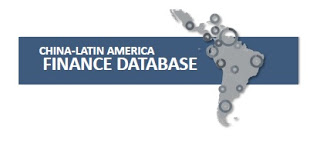It has been proven that the Soviet KGB funded terror and operations against the West.
Now we have China doing the same thing in the Western hemisphere.
China Boosts Support for Latin Leftists
China Pledged Billions of Dollars of Financing to Venezuela and Ecuador, Two South American Energy Exporters Battered by Falling Oil Prices
China pledged billions of dollars of financing to Venezuela and Ecuador, two South American energy exporters battered by falling oil prices, as Beijing moved to secure resources and allies in the region.
China has increased its diplomatic clout throughout Latin America by extending over $100 billion in credit to the region since 2005, according to figures from Boston University’s Global Economic Governance Initiative.
Beijing has become the biggest foreign financier of both Venezuela and Ecuador, two oil-rich, leftist allies eager to help counter U.S. sway in the region.
Following a meeting with Chinese President Xi Jinping , his Venezuelan counterpart Nicolás Maduro announced bilateral accords that would bring $20 billion in new investment to Venezuela. Ecuador said it secured $7.5 billion in financing.
Both Mr. Maduro and his Ecuadorian counterpart, Rafael Correa, were in Beijing along with officials from various Latin American nations to take part in a regional gathering.
Both Latin countries, highly dependent on oil exports to pay for heavy public spending, were in dire need of a helping hand as crude prices tumble to less than half of their level from several months ago. A barrel of oil sold for about $50 on Wednesday.
Last week, Venezuela’s central bank released long-delayed figures, revealing the country entered a recession in 2014.
Venezuela needs oil to average around $117.50 a barrel to balance its 2015 budget, according to Deutsche Bank estimates.
In Ecuador, officials have reported a slowing economy, with growth of 3.4% in the third quarter, down from 5.6% in the July-through-September period in 2013.
Mr. Maduro, who has seen his approval rating swoon along with oil prices, offered few details on the new accords with China, which he said involved projects in the energy, industrial and housing sectors.
The Venezuelan leader, who has struggled to keep supporters happy amid shortages of basic goods, praised China for coming to the rescue.
“The economic war against our people and the oil price war is an opportunity to grow closer to our allies,” said Mr. Maduro, who has blamed Venezuela’s spiraling economy on an alleged plot by enemies of his leftist government.
Venezuela is slated to hold hotly contested legislative elections in December that many analysts see as a referendum on Mr. Maduro’s performance.
At a daily press briefing on Wednesday, Chinese Foreign Ministry spokesman Hong Lei said “Relevant financing cooperation is going smoothly” with Venezuela. State-run China Central Television paraphrased Chinese President Xi Jinping as calling for “promoting oil development” in a meeting with Mr. Maduro.
Experts said it was unclear without further details what kind of impact the new financing would have on the Venezuelan and Ecuadorian economies.
China has extended to Caracas some $50 billion in credit since 2007 in exchange for guaranteed oil. It has committed more than $12 billion in financing to Ecuador between 2009 and 2014.
Wednesday’s agreement underscored China’s continuing support for Mr. Maduro despite his political woes, said Risa Grais Targow, senior Latin America analysts for Eurasia Group.
“This is because the Chinese are heavily exposed to Venezuela and are likely concerned about the prospect of regime change,” she said in a client note.
China-Latin America Finance Database
Since 2005, China has provided upwards of $87 billion in loan commitments to Latin American countries. China’s loan commitments of $37 billion in 2010 were more than those of the World Bank, Inter-American Development Bank, and U.S. Export-Import Bank combined. This interactive database provides up-to-date information on Chinese lending in Latin America by country, lender, sector and year.
This database stems from a collaborative project by Boston University’s Global Economic Governance Initiative and Tufts University’s Global Development and Environment Institute. The resulting Inter-American Dialogue publication, The New Banks in Town: Chinese Finance in Latin America, by Kevin Gallagher, Amos Irwin, and Katherine Koleski is the main source of featured data and conclusions. Loan data is updated on an annual basis.

